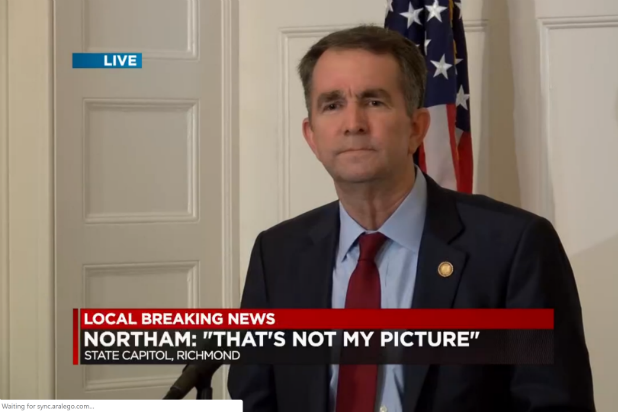
The Virginia governor's initial reaction to a shocking image of a man in black face standing next to someone dressed in a Klan outfit that appeared on his page of his medical school yearbook was to admit one of the figures was him.
His news conference the next day taking his confession back was, even if you believe his latest strange account (he supposedly knew nothing about his page or the yearbook), maladroit and cringe-inducing. It included the revelation that he used shoe polish to darken his face as part of a Michael Jackson costume he wore in a dance contest.
In 2017, when Northam won the governorship, he slimed as a racist his Republican opponent Ed Gillespie, a well-respected Republican whose alleged sin was running ads against MS-13.
Finally, in another controversy last week, Northam endorsed infanticide and refused to walk it back.
It's hard to recall a politician who has so quickly and starkly been exposed as a cipher who ascended to a major office almost by accident (any Democrat would have won in Virginia in 2017).
So there won't be a lot of tears for Ralph Northam, but the controversy consuming him is disturbing nonetheless for what it portends about the drift of our political culture. It is increasingly frenzied, unforgiving and irrational, and only likely to get more so.
Let's assume for the sake of argument that Northam is in the yearbook image. What does that tell us about him? That he was thoughtless as a young man? That he had bad taste? That he was immature? Yes, all of the above. But does it mean that he was a racist? This is the leap that the sweeping condemnations of Northam implicitly or explicitly make.
In our public debate, we are losing the gray area of things that are offensive and ignorant — the yearbook image is emphatically both — for categorical assertions of racism. The difference is that ignorance can be forgiven and learned from, whereas racism must be punished. The old cliché that used to be repeated during racially charged controversies, "a teaching moment," now feels quaint in this new era of headhunting.
What is there to be taught or learned, after all, if Northam was an ally of white supremacy? That term used to be applied to the worldview of skinheads and neo-Nazis. Now, it is becoming a catch-all. The lieutenant governor of Virginia, Justin Fairfax, who has been gentler in his denunciations than most, said the yearbook image suggests "a comfort with Virginia's darker history of white supremacy, racial stereotyping and intimidation."
This is why there's no statue of limitations anymore — any offense is considered too grave for that. As far as Northam's critics are concerned, his yearbook image might as well have been published last year, not 35 years ago. There's no allowance that the person who appeared in the image might be different than the person sitting in the governor's mansion.
Nor is there any inquiry into whether the image was part of a pattern of conduct at the time. Did Northam express hostility to African-Americans in any other way? No one has produced any substantial evidence of this, or seems to have any interest in producing any.
By the same token, it doesn't matter that Northam has an impeccable civil-rights record. His three-decade-old lapse wipes out the rest of his adult life.
Actually, the mere fact that he is believed to have had such a lapse is disqualifying. The Democrats calling for him to resign now have no interest in whether he is really in the yearbook image or not.
Northam has certainly done himself and his credibility no favors. Public life won't be poorer without him. But the collective outrage now devouring him will find new targets and occasions for headhunting, and more deserving public figures will fall prey to it.
Sign up for the daily JWR update. It's free. Just click here.
(COMMENT, BELOW)


 Contact The Editor
Contact The Editor
 Articles By This Author
Articles By This Author